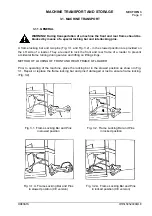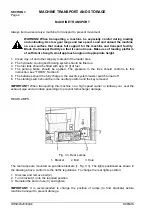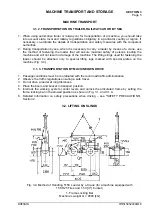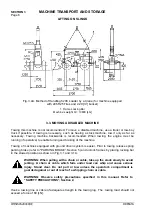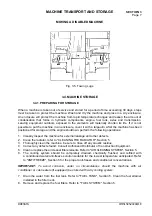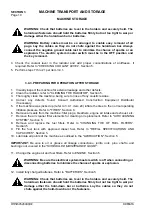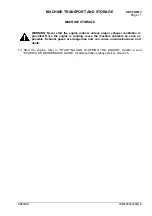
OPERATING
SECTION 4
Page 3
DRESSTA
OM515C520C99/1E
4.1. GENERAL
Stay alert and aware of what you are doing. Use common sense. Do not operate when ill or
fatigued.
Know your machine.
For your safety, read the Operator's Manual carefully and follow all instructions and precautions.
Read carefully Section 2 and follow safety precautions specified therein.
Before starting or operating this machine, read the following general precautions. These are listed
there to help you protect the machine and to remind you of protection for yourself and those around
you. Common sense and observance of these rules will help make your job a safer one. Perform a
visual check of the machine before starting the engine. Look for such things as missing protective
devices, leaks, improper fluid levels, trash buildup and loose, damaged or missing parts. DO NOT
start the engine until any unsafe conditions are corrected.
Keep the transmission in low gear when going downhill. Never coast downhill with the transmission
in neutral because the machine could go out of control and tip over. Always drive the machine
slowly when on hillsides, ramps or rough terrain. Be extremely careful when working around
trenches or banks. Failure to do so could cause the machine to roll over.
Before starting operation, check the machine for correct function of the steering controls, brake
controls, hydraulic controls, instruments and safety equipment. Make all necessary repairs or
adjustments before operating the machine.
Do not place a machine under load without the proper engine oil pressure and operating
temperature. After starting the engine, move the accelerator pedal to the low idle position.
Allow the engine to run at low idle for 3 to 5 minutes at 1000 [RPM] until normal oil pressure
registers on the gauge to obtain complete distribution of the lubricating oil. Do not run the engine idle
more than 10 minutes. To prevent any possible damage to the alternator, the electric system
master switch must be in the ON position when the engine is running. The switch must be in the
OFF position when the engine is shut down at the end of each day or when the operator leaves the
machine unattended.
Never park in places contaminated with grease or oil to prevent tire damage.
Never park in swampy area as it may cause freeze-up of the tires.
Never pour cold coolant into the radiator when the engine is hot unless conditions make it absolutely
necessary. Use extreme caution as hot coolant could cause burns. Keep your face away from the
filler neck. Under such conditions, start the engine and let it idle while slowly pouring coolant into the
radiator. The engine is recommended to be allowed to cool down
to 50 [
°
C].
Pouring cold coolant into a hot engine may cause damage to the cast components of the engine.
Fill the fuel tank at the end of each day’s work to reduce condensation.
When towing with a long chain or cable, take up the slack slowly to avoid jerking. Before shutting
down operate the engine at idle (no load) for 3 to 5 minutes. This will aid in cooling the engine and
turbocharger.
Summary of Contents for 515C
Page 3: ...OM515C520C99 1E DRESSTA ...
Page 5: ......
Page 7: ......
Page 10: ...SECTION 1 INTRODUCTION ...
Page 12: ......
Page 17: ...SECTION 2 SAFETY PRECAUTIONS ...
Page 19: ......
Page 37: ...SECTION 3 MACHINE TRANSPORT AND STORAGE ...
Page 39: ......
Page 49: ...SECTION 4 OPERATING ...
Page 51: ......
Page 107: ...SECTION 5 MAINTENANCE ...
Page 165: ...SECTION 6 SPECIFICATIONS ...
Page 167: ......
Page 181: ...SECTION 6 SPECIFICATIONS Page 16 OM515C520C99 1E DRESSTA WIRING DIAGRAMS ...
Page 182: ...SPECIFICATIONS SECTION 6 Page 17 DRESSTA OM515C520C99 1E WIRING DIAGRAMS ...
Page 187: ...SECTION 6 SPECIFICATIONS Page 22 OM515C520C99 1E DRESSTA WIRING DIAGRAMS ...



